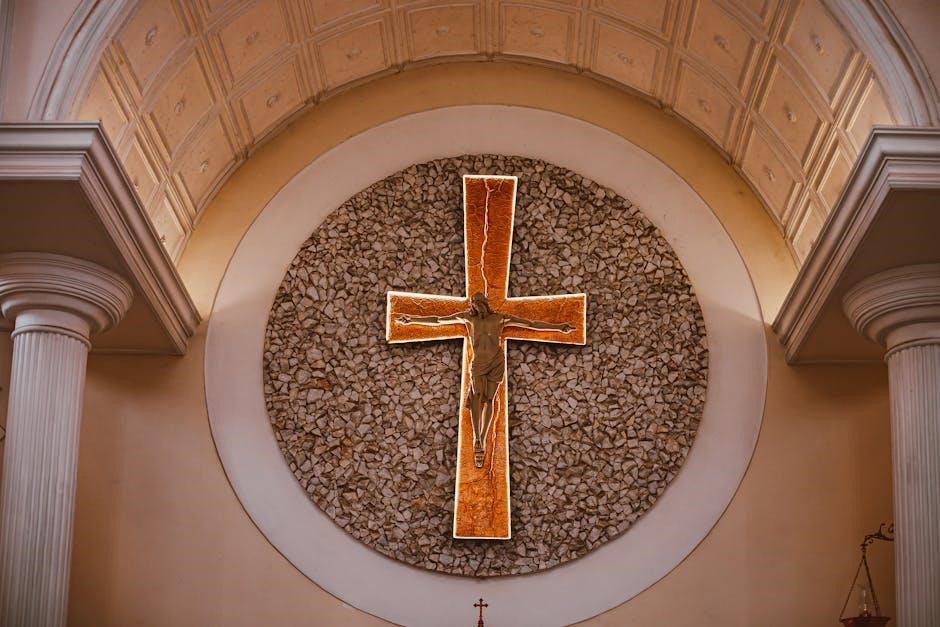Non denominational church bylaws pdf provide guidelines for church operations‚
governing
documents that outline membership and leadership roles‚ ensuring order and stability within the church community‚ with rules and regulations to follow‚ for a harmonious and organized church environment always․
Definition and Purpose of Bylaws
The definition of bylaws in the context of a non denominational church refers to a set of rules and regulations that govern the operations of the church‚ providing a framework for decision-making and ensuring the church is run in an orderly and efficient manner․
The purpose of bylaws is to establish clear guidelines for the church’s leadership‚ membership‚ and activities‚ and to provide a sense of stability and continuity․
Bylaws typically cover topics such as membership qualifications‚ church meetings‚ leadership roles‚ and financial management‚ and are often adopted by the church’s founding members or governing board․
In the case of a non denominational church‚ the bylaws may also address issues related to the church’s independence and autonomy‚ such as its relationship with other churches or denominations․
Overall‚ the definition and purpose of bylaws is to provide a clear and comprehensive guide for the governance and operation of the church‚ and to ensure that the church is able to fulfill its mission and purposes․
The bylaws are an essential document for any church‚ and are often reviewed and updated regularly to ensure they remain relevant and effective․
By having a clear and well-defined set of bylaws‚ a non denominational church can ensure that it is able to operate in a way that is consistent with its values and mission‚ and that it is able to provide a positive and supportive community for its members․
The bylaws are an important part of the church’s overall governance structure‚ and play a critical role in ensuring the church’s long-term success and viability․
They provide a framework for decision-making‚ and help to ensure that the church is able to respond to challenges and opportunities in a timely and effective manner․
In addition‚ the bylaws can help to promote transparency and accountability within the church‚ by establishing clear guidelines and procedures for financial management and other key activities․
By providing a clear and comprehensive guide for the governance and operation of the church‚ the bylaws can help to build trust and confidence among the church’s members and stakeholders․
This can be especially important for a non denominational church‚ which may not have the same level of external oversight or support as a church that is part of a larger denomination․
Overall‚ the definition and purpose of bylaws is to provide a clear and effective framework for the governance and operation of a non denominational church‚ and to help ensure the church’s long-term success and viability․
The bylaws are an essential document for! any church‚ and play a critical role in promoting transparency‚ accountability‚ and good governance․
They are an important part of the church’s overall governance structure‚ and can help to build trust and confidence among the church’s members and stakeholders․
By having a clear and well-defined set of bylaws‚ a non denominational church can ensure that it is able to operate in a way that is consistent with its values and mission‚ and that it is able to provide a positive and supportive community for its members․
This can help to promote a sense of stability and continuity‚ and can provide a foundation for the church’s long-term success and growth․
In conclusion‚ the definition and purpose of bylaws is to provide a clear and comprehensive guide for the governance and operation of a non denominational church‚ and to help ensure the church’s long-term success and viability․
The bylaws are an essential document for any church‚ and play a critical role in promoting transparency‚ accountability‚ and good governance․
They are an important part of the church’s overall governance structure‚ and can help to build trust and confidence among the church’s members and stakeholders․
By having a clear and well-defined set of bylaws‚ a non denominational church can ensure that it is able to operate in a way that is consistent with its values and mission․
The bylaws provide a framework for decision-making‚ and help to ensure that the church is able to respond to challenges and opportunities in a timely and effective manner․
This can help to promote a sense of stability and continuity‚ and can provide a foundation for the church’s long-term success and growth․
In addition‚ the bylaws can help to promote transparency and accountability within the church‚ by establishing clear guidelines and procedures for financial management and other key activities․
Overall‚ the definition and purpose of bylaws is to provide a clear and effective framework for the governance and operation of a non denominational church․
The bylaws are an essential document for any church‚ and play a critical role in ensuring the church’s long-term success and viability․
By providing a clear and comprehensive guide for the governance and operation of the church‚ the bylaws can help to build trust and confidence among the church’s members and stakeholders․
This can be especially important for a non denominational church‚ which may not have the same level of external oversight or support as a church that is part of a larger denomination․
The bylaws provide a framework for decision-making‚ and help to ensure that the church is able to respond to challenges and opportunities in a timely and effective manner․
In conclusion‚ the definition and purpose of bylaws is to provide a clear and comprehensive guide for the governance and operation of a non denominational church‚ and to help ensure the church’s long-term success and viability․
The bylaws are an essential document for any church‚ and play a critical role in promoting transparency‚ accountability‚ and good governance․
They are an important part of the church’s overall governance structure‚ and can help to build trust and confidence among the church’s members and stakeholders․
By having a clear and well-defined set of bylaws‚ a non denominational church can ensure that it is able to operate in a way that is consistent with its values and mission‚ and that it is able to provide a positive and supportive community for its members․
This can help to promote a sense of stability and continuity‚ and can provide a foundation for the church’s long-term success and growth․
The bylaws provide a framework for decision-making‚ and help to ensure that the church is able to respond to challenges and opportunities in a timely and effective manner․
In addition‚ the bylaws can help to promote transparency and accountability within the church‚ by establishing clear guidelines and procedures for financial management and other key activities․
Overall‚ the definition and purpose of bylaws is to provide a clear and effective framework for the governance and operation of a non denominational church․
The bylaws are an essential document for any church‚ and play a critical role in ensuring the church’s long-term success and viability․
By providing a clear and comprehensive guide for the governance and operation of the church‚ the bylaws can help to build trust and confidence among the church’s members and stakeholders․
This can be especially important for a non denominational church‚ which may not have the same level of external oversight or support as a church that is part of a larger denomination․
The bylaws provide a framework for decision-making‚ and help to ensure that the church is able to respond to challenges and opportunities in a timely and effective manner․
In conclusion‚ the definition and purpose of bylaws is to provide a clear and comprehensive guide for the governance and operation of a non denominational church․
The bylaws are an essential document for any church‚ and play a critical role in promoting transparency‚ accountability‚ and good governance․
They are an important part of the church’s overall governance structure‚ and can help to build trust and confidence among the church’s members and stakeholders․
By having a clear and well-defined set of bylaws‚ a non denominational church can ensure that it is able to operate in a way that is consistent with its values and mission․
The bylaws provide a framework for decision-making‚ and help to ensure that the church is able to respond to challenges and opportunities in a timely and effective manner․
This can help to promote a sense of stability and continuity‚ and can provide a foundation for the church’s long-term success and growth․
The bylaws can help to promote transparency and accountability within the church‚ by establishing clear guidelines and procedures for financial management and other key activities․
Overall‚ the definition and purpose of bylaws is to provide a clear and effective framework for the governance and operation of a non denominational church․
The bylaws are an essential document for any church‚ and play a critical role in ensuring the church’s long-term success and viability․
By providing a clear and comprehensive guide for the governance and operation of the church‚ the bylaws can help to build trust and confidence among the church’s members and stakeholders․
This can be especially important for a non denominational church‚ which may not have the same level of external oversight or support as a church that is part of a larger denomination․
In addition‚ the bylaws can help to promote transparency and accountability within the church‚ by establishing clear guidelines and procedures for financial management and other key activities․
The bylaws provide a framework for decision-making‚ and help to ensure that the church is able to respond to challenges and opportunities in a timely and effective manner․
In conclusion‚ the definition and purpose of bylaws is to provide a clear and comprehensive guide for the governance and operation of a non denominational church‚ and to help ensure the church’s long-term success and viability․
The bylaws are an essential document for any church‚ and play a critical role in promoting transparency‚ accountability‚ and good governance․
They are an important part of the church’s overall governance structure‚ and can help to build trust and confidence among the church’s members and stakeholders․
By having a clear and well-defined set of bylaws‚ a non denominational church can ensure that it is able to operate in a way that is consistent with its values and mission‚ and that it is able to provide a positive and supportive community for its members․
The bylaws provide a framework for decision-making‚ and help to ensure that the church is able to respond to challenges and opportunities in a timely and effective manner․
This can help to promote

Articles of Incorporation

The church’s articles of incorporation outline its purpose‚
name and identity
‚ and are typically filed with the state‚ establishing the church as a legal entity‚ with its own set of rules and governing documents to follow always carefully․
Name and Identity of the Church
The name and identity of the church are crucial components of its articles of incorporation‚ as they establish the church’s purpose and mission․ The church’s name should reflect its values and beliefs‚ and should be unique to avoid confusion with other organizations․ The church’s identity is also shaped by its statement of faith‚ which outlines its core beliefs and values․ This statement serves as a guiding document for the church’s teachings and practices‚ and helps to establish its reputation within the community․
According to the internet‚ the church’s name and identity are typically outlined in its articles of incorporation‚ which are filed with the state․ The church’s bylaws may also provide additional guidance on its name and identity‚ and may include provisions for amending or changing the church’s name or statement of faith․ Overall‚ the name and identity of the church are essential to its mission and purpose‚ and should be carefully considered and established from the outset․
The church’s name and identity are also important for establishing its tax-exempt status and obtaining necessary licenses and permits․ The church’s bylaws and articles of incorporation should be carefully reviewed and updated regularly to ensure compliance with all applicable laws and regulations․ By establishing a clear and consistent name and identity‚ the church can build trust and credibility with its members and the wider community‚ and can more effectively achieve its mission and purpose․

Bylaws of Crossroads Christian Church
Church governance is outlined in the bylaws‚ with rules for membership‚ meetings‚ and leadership roles‚ ensuring order and stability within the church community always‚ with guidelines to follow‚ for a harmonious environment․
Formation and Adoption of Bylaws
The formation and adoption of bylaws is a crucial step in the establishment of a non denominational church‚ as it provides a framework for governance and decision-making․ The process typically involves the creation of a draft document that outlines the church’s purpose‚ membership requirements‚ and leadership structure․ This draft is then reviewed and revised by the church’s leadership team‚ which may include the pastor‚ deacons‚ and other key officials․ Once the bylaws have been finalized‚ they are presented to the church membership for approval․ The adoption of bylaws is typically done through a vote‚ with a majority of members required to approve the document․ The bylaws may also include provisions for amendments‚ which allow the church to make changes to the document as needed․ Overall‚ the formation and adoption of bylaws is an important step in establishing a non denominational church‚ as it helps to ensure order‚ stability‚ and continuity․ The bylaws serve as a guide for the church’s operations‚ and provide a clear understanding of the church’s purpose and mission․ By having a well-defined set of bylaws‚ the church can operate more effectively and efficiently․

Sample Church Bylaws
Non denominational church bylaws pdf samples provide templates for creating governing documents‚ outlining church structure‚ membership‚ and leadership‚ to ensure order and stability within the church community‚ with rules and regulations to follow always effectively․
Creating Your Own Bylaws
Creating your own bylaws for a non denominational church involves several steps‚ including defining the church’s purpose‚ membership requirements‚ and leadership structure․ It is essential to establish a clear and concise set of rules and regulations that outline the church’s governance‚ financial management‚ and decision-making processes․ A well-crafted set of bylaws will help ensure the church’s stability and longevity․
When creating your own bylaws‚ it is crucial to consider the church’s unique needs and circumstances․ This may involve consulting with legal professionals‚ church leaders‚ and members to ensure that the bylaws accurately reflect the church’s values and mission․ Additionally‚ it is essential to review and update the bylaws regularly to ensure they remain relevant and effective․
A non denominational church bylaws pdf can serve as a useful template or guide for creating your own bylaws․ These samples can provide a starting point for outlining the church’s structure‚ membership‚ and leadership‚ as well as its financial management and decision-making processes․ By using a non denominational church bylaws pdf as a reference‚ you can create a comprehensive and effective set of bylaws that will help your church thrive․
Ultimately‚ creating your own bylaws requires careful consideration‚ planning‚ and attention to detail․ By taking the time to craft a well-written and comprehensive set of bylaws‚ you can help ensure your non denominational church remains stable‚ effective‚ and true to its mission and values․



